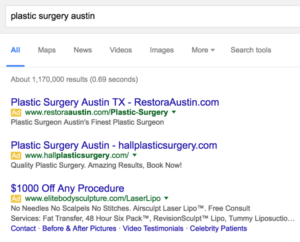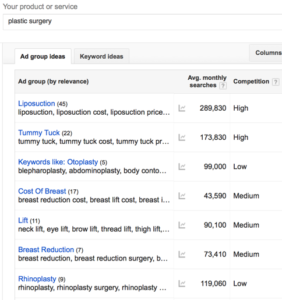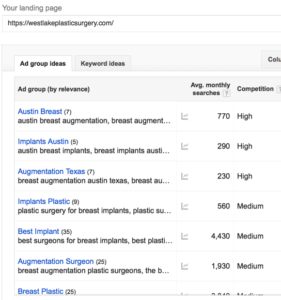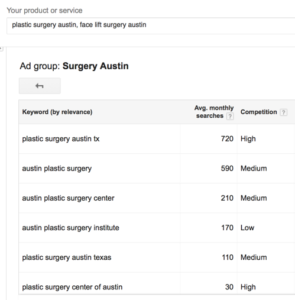Type in a keyword relevant to the cosmetic surgery industry. At the very top of the search results you will likely see plastic surgery paid search campaigns:
The text ads all come from AdWords, Google’s paid search advertising platform. Business owners and marketers can create ads that only display for keywords they bid on. Creating an account is simple enough and you could be driving highly targeted traffic to your landing pages the very same day you start your campaign.
But will it be profitable?
It depends.
AdWords can be incredibly expensive. Each click for plastic surgery related search queries can easily cost several dollars or more. Target the wrong keywords and you can quickly burn through your marketing budget without seeing any conversions. Target the right ones and you can expect to see a high return on your investment.
Keyword research is one of the most important aspects of an AdWords campaign for this reason. Your ads are only triggered for keywords you bid on so you need to understand the phrases that your audience is searching for. But the process can be rather confusing especially for those who have yet to start a paid search campaign.
The following is an in-depth guide that covers the basics of keyword research, how to expand your list, and how to organize it. A strong foundation is the key to more effective PPC campaigns and it all starts with keyword research.
The Different Keyword Types
Google makes it effortless to get started with an ad campaign.
But first you will want to spend some time with building your keyword list. This is a list that contains phrases that your audience is searching for to find the services that your practice offers. A highly targeted ad that matches the intent of the search is far more likely to result in a click through and potentially a sale.
Keywords can be broken into the following categories:
- Informational terms: The searcher is looking for more information that relate to services offered (e.g. “plastic surgery FAQs”, “tummy tuck procedure overview”, “how much does a facelift cost?”, “plastic surgery before and after pictures”, etc.). These are the type of keywords that make for excellent blog topics for your site.
- Purchasing terms: These are terms that have purchasing intent behind. A search for “face lift surgeons in Austin” is far more likely to convert than a search for just “face lift” as the former implies that the searcher is ready to find and meet with a plastic surgeon.
- Brand terms: These are any keywords that contain your brand name and other trademarked terms. Even if you rank in the first result for your brand name, it is still a good idea to bid on it.
- Competitor terms: These are the brand names of competitors who offer similar services to yours. In some cases, you could actually outrank your competitors for their own brand names. Bidding on these terms can help you capture even more sales for your business but keep in mind that it can be fairly expensive as well.
So which keywords should you add to your campaign?
Purchasing terms will undoubtedly convert better. But it is also a good idea to bid on the other terms to further increase your reach online. Someone landing on your page from an informational search could very well end up contacting your practice to learn more about your services.
Brainstorming Relevant Keywords
Now it is time to start brainstorming a keyword list. You can always refine your list later so don’t be afraid to jot down as many keywords as you can. Here are ways to help you brainstorm keywords you can use for your PPC campaign.
Put yourself in your customer’s shoes: Think about the services your practice offers and your target market. What queries would they type in to land on your site? Start with a broad search term then make it more specific. Here are some examples:
Plastic surgery > plastic surgery procedures > plastic surgeons in Austin, Texas
Eyelid surgery > eyelid surgery overview > eyelid surgery in Westlake
Use different keyword tools: Tools are particularly valuable as they can reveal hidden keywords you may never have thought to use. One of the best is Keyword Planner which is accessible directly from the dashboard in AdWords. Simply type in your main keywords and click “Get ideas” for additional search terms.
Here you can see additional information including estimate search traffic and competition levels.
Another invaluable tool is UberSuggest.
Use these tools together to discover new keywords and expand your list.
Steal keywords from your competitors: Your competitors are another excellent source of keyword ideas. Search for your main keywords and note down the URLs of any sites that are ranking on the first page. Then copy those URLs and paste them into Keyword Planner in the “Your landing page” field and click “Get ideas”. On the next page you will see all the keywords that Google thinks is most relevant to that page.
Do these steps for each of your landing pages and you should have a decent list.
Expanding Your Keyword List
People use all types of variations in their searches.
One example is with athletic sportswear. Some users may search for “shoes” while others may search for “sneakers”. Google is sophisticated enough to display your ads when closely related terms are searched for but this is not always the case. So include variations as well as synonyms in your keyword list such as:
- Tummy tuck surgery
- Tuck tuck operation
- Abdominoplasty surgery
- Abdominoplasty procedure
Another way to expand your list is with a technique called “concatenation”. The mergewords tool lets you easily merge columns of words together and generate a list of all possible permutations:
Refining Your Keyword List
If you followed the steps above you likely have hundreds of keywords in your list.
Bidding on all of them is simply not practical.
So the next step is to determine which keywords to keep and which ones to drop. This is where Google’s Keyword Planner is especially invaluable as you can see estimated search volume for each phrase. There is also a competition rating of high, medium, and low. A high competition rating means that demand is stronger so you can expect to bid more to push your ad higher.
One mistake that many business owners make is including keywords that are too broad.
A phrase such as “plastic surgery” undoubtedly has high search volume. But the intention behind that search is not clear. The searcher could be considering a career in that field or looking to buy a book. A long tail keyword such as “tummy tuck surgery Westlake” may have fewer searches per month but the searcher is far more likely to make a purchase.
These are exactly the kind of keywords to target.
So start narrowing down your list and also take costs into consideration.
If competition is too high or there is barely any search volume, drop those keywords from your list. Now you should have a rather impressive keyword list that is far more likely to generate a positive return for your practice. These are the keywords that you will be using when creating your campaigns.
Conclusion
AdWords is a powerful marketing platform that you can get started with today. But just because you can create a campaign quickly doesn’t mean you should. Keyword research is easily one of the most important steps so spend more time here to get it right from the start. Use the strategies above to identify keywords that your target audience is searching for and to refine your list.





